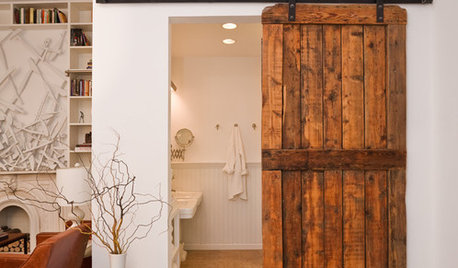Farm Dog Question
Hi. In a month my boyfriend and I are going to be moving to a 200 acre ranch that his parents own. I'm so excited to get out of this apartment and would love to get a couple (since they will probably be living outside I think I should get two) dogs.
My family has always had dogs, but they were raised inside. Most of the stuff I've read on the internet says that a dog will not be well adjusted if it isn't raised inside and allowed to sleep inside with the family. I don't think that this is an option for me though because we are renting the house from my boyfriends parents and they don't want inside dogs.
I read that some of y'all have had happy outdoor farm dogs and my question is how is it done? The dogs would have lots of shelter (both a barn and stable), but my main concern is that the fences are all cattle fences that a dog could easily get through. It there a way to train it to stay on the property?
There are coyotes out there so I want a large breed. I'm partial to labs because that is what I grew up with. We will most likely be getting the dog from the shelter. I'm also unsure about what age dog would be best. I'm not going to get a baby unless I'm allowed to housebreak it inside. If I brought a young dog or an older adult dog home how would it know that the farm is its new home?
Any advice y'all have would be much appreciated.
thanks,
Whitney
Comments (22)
curdog007
15 years agolast modified: 9 years agoGet two blackmouth curs, like ole yeller. Keep 'em outside.
lynnwhittly
Original Author15 years agolast modified: 9 years agoThanks Lynn. I'd never even heard of a Blackmouth Cur! I always thought ole yeller was a lab. I googled them and they are adorable.
Related Professionals
Comstock Park Landscape Architects & Landscape Designers · Glassmanor Landscape Architects & Landscape Designers · North New Hyde Park Landscape Architects & Landscape Designers · Ringwood Landscape Contractors · Stony Brook Landscape Contractors · Washington Landscape Contractors · Antioch Fence Contractors · Chaska Fence Contractors · Lake Forest Fence Contractors · Long Beach Fence Contractors · Maple Grove Decks, Patios & Outdoor Enclosures · Shorewood Decks, Patios & Outdoor Enclosures · Boston Decks, Patios & Outdoor Enclosures · Honolulu Decks, Patios & Outdoor Enclosures · Meridian Decks, Patios & Outdoor Enclosuresyakimadn
15 years agolast modified: 9 years agoGuess it would depend on what you want it to do. If you just want something to lay around and leave booby traps in the yard, or something that will adopt and look after the place. IMO, shelter dogs are in a shelter for a reason, it'd really suck to have that poor lonely dog from the pound take the arm off the neighbor kid when he/she does something to jog a bad memory or wipe out a neighbors poultry flock. I'd suggest something like a Great Pyrinese or some type of livestock gaurd dog or farm shepherd mutt. A puppy will learn everything you teach it and not have to sort out your ideas with bad passed experiences.
Just my .02.
Dave
carmen_grower_2007
15 years agolast modified: 9 years agoMy only suggestion would be to get one dog first, train it thoroughly so it will stay in the boundarys of the farm and then introduce the second one. Training two dogs at once is difficult and if you get one first, it will help to train the second one.
whittly
Original Author15 years agolast modified: 9 years agoThanks for your advice. Great Pyrenese was actually a breed we're considering. There is a great pyrenese rescue group in Ft. Worth.
I also posted this message on the pets forum and y'all seem a lot more optimistic.
-Whitneyhenhilton
15 years agolast modified: 9 years agoGotta speak up for the Pound Pup here. Years of experience working at shelters and with rescue groups has taught me that yes, there are some problem dogs with a "reason" for winding up at the shelter. More often I have seen problem people who had no clue what pet ownership involved, and the best, smartest, most loving dog in the world couldn't overcome their ignorance.
That said, my experience with canines has been that some of them like to stay around the homeplace, others succomb to wanderlust. Sometimes there's no telling which is which until you really know the dog. I would try to avoid adopting an "older" dog who is accustomed to living in the house, as he/she would likely feel unloved/unattached and wander off if left outside all the time. Sometimes shelters/rescue groups will know more about the history of one particular dog than another. It's worth asking. Choosing by breed isn't 100%, either. Most Great Pyrinese are wonderful herd dogs and loyaly stay with their charges. But I've seen an awful lot of happy white giants loping, care-free, down the country lanes, too.
I agree with carmen about training one dog first, then getting a companion. With two newbies together, whatever mischief one doesn't think of, the other will! When you have one well trained, he/she will help to train the newcomer.
Best advice I can offer is to trust your gut feeling with each potential adoption candidate you meet. And be prepared to work with and adapt to whatever developes with your new family members. Sometimes a trait that seems to be a liability at first blush can turn into a blessing in the long run!
pam
whittly
Original Author15 years agolast modified: 9 years agoThanks Pam. I'm definately going to be getting my dog from the shelter. I've worked at a couple myself and it seems like the majority of dogs are young dogs that out grew their adorable phase, but still are puppies at heart.
One of my main concerns are the first few nights. If I brought a dog home how fast would it learn to stay around? I'm considering investing in an invisible fence.
This summer my boyfriend and I will be home almost at all times so I'm going to have PLENTY of time to spend with it. Outside only dogs are just so out of my realm of experience. I'm really glad to hear that most of you don't think it would be cruel and unusual punishment to keep a dog outside.billie_ladybug
15 years agolast modified: 9 years agoOur dogs are allowed in and out as they please, they tend to prefer out. The old lady is Lab, Pyrenese and Shepard (German). She is a good dog, but she likes to wander some. Never bothers anyone, just likes to roam. She keeps the coyotes and rabbits at bay. Her sister, on the other hand, attacked our piglets and then, when I went to get her off the last one, she turned on me. We put her down immediatly, no question. They were raised the same, but had different instincts.
From my experiance, I would advise against the Black Mouth Cur. They are an territorial breed, pretty yes, but territorial. Anyone new will be in danger. They don't take kindly to much. They are a one person animal, not a one family animal. They are very protective, but can be scary. The neighbors have one that they have to lock up if anyone comes on the property, she will try to bite them even after being told that it is ok. The dog attached herself to the husband. The wife cannot even touch her husband with the dog in the room, the dog will attack her. The dog also tries to bite people walking down the road. We actually take a baseball bat on walks with us because of this dog. Another neighbor had one, a male, that was the same way. He would get aggressive if you were in his seat on the couch and my kids had to be very careful around him. It really was a one false move thing. Even tripping was dangerous. I did not go there very often. I'm sure the whole breed is not like this, but because of my experiance with them, I would caution people about them.
We really like our labs and border collies. The only problem is the collies think they have to "herd" everything: chickens, horses, children, you name it, they will try to herd it.Good luck
Billiebillie_ladybug
15 years agolast modified: 9 years agoI have used old jeans in the doghouse to keep them warm and comfy. Works great.
Billie
critterkeeper
15 years agolast modified: 9 years agoGreat Pyrenese are great. I am co-founder of an animal rescue group celebrating ten years of hard work in our community. I have rescued many animals and can attest to the fact that you are getting an unknown in a rescue. Even Pyrenese rescue can be a problem. I live on 60 plus acres. I have several rescued farm animals in addition to my rescued dogs and cats. At one point I had nine dogs in various situations to accomodate their special needs, i.e. didn't like cats, kids, men- you get the picture. I have lost several animals this way, dogs and cats, and sadly, a goat and all my chickens and rooster. The geese have somehow managed to survive. I never wanted to replace the chickens. But when something snatched my old, blind, deaf dachsy from her fenced back yard which had been her haven for many years with access to the house through a dog door, I broke my vow never to buy a dog. I now have two Pyrs that I love dearly, are great with all the other dogs, cats, chickens, geese, goats, pigs, and grandkids of all ages. I got a pair as 3 month old pups from a situation where they were around many more species of animals than mine including llamas, emus, and the more traditional farm animals. I suggest you find some pups from the same situation and get them after you have acquired some of your own farm stock. They like to have something to protect. Their instincts are strong. I had left the fence open to the goats one day who wandered into the barnyard. Even as puppies the pyrs rounded them up and put them back in their place! Since I got the goons (as I affectionately call them as they are quite LARGE) I have restocked my hen house, have a setting broody goose and added more resued farm animals and haven't lost a critter. They are wonderful!
camaria
15 years agolast modified: 9 years agoI have an invisible fence installed to keep our German Shepard on the acreage when we're gone. It works great. She doesn't leave, even when neighbor dogs come over to play and run through the fence, she stays behind her boundary. She has two acres to run around on and we don't have to keep her on a leash when we're gone. That said, there are a number of things you need to consider if you're thinking of getting one of these invisible fences.
1. It's not going to work with an agressive or even an excitable dog. Basically the static electricity zap the dog gets only lasts while it is within a ten foot range on either side of the fence. If your dog really wants out, and he's stubborn, he'll just run right through, wince as he gets zapped a few times and voila, once he's on the other side, he's free (unless you're getting a wireless system. They work a little differently). Still, with an excitable or aggresive dog, these fences don't work because if these dogs want out, they'll tolerate a bit of discomfort to get out. Passive dogs work best.
2. It takes A LOT of training for these fences to work. I'm talking about two weeks of at least an hour a day training. As a poster above mentioned, during this training period, the dog cannot be left unrestrained on its own outside at all. No leaving the property on walks, or in vehicles. Dog must be on a leash at all times while training.
3. If you're getting larger breed dogs, the collars that they sell with the system usually won't be strong enough. We ran into that mistake with our dog. She'd respond perfectly to her training until we weren't looking, then run through the fence when she thought no-one could see her. She could feel the zap, but it didn't bother her. That means you'll have to either buy a 'stubborn dog' collar invisible fence system to start with (The collar gives a stronger zap) or you'll just have to shell out the cash for one later.
Sorry for rambling on, but just thought you'd like to have these things to consider. Invisible fence is a great system for the right dogs, but it takes some training. Our outside dog is very happy! Neighbor dogs come visit to play, but she never leaves the yard!
Best of luck and have fun training!
whittly
Original Author15 years agolast modified: 9 years agoThank you so much for your advice everyone. It has been really helpful and encouraging. Critterkeeper, I'm glad to hear you've had such a great experience with Great Pyreneses. How old were yours when you got them?
Camaria, you say you use the invisible fence when you aren't home. When you are home do you still use it? My parents have an invisible fence they use with their lab, but that is one laid back dog and I can see how it might not be as effective with some of the more energetic breeds.
When we had puppies we always put them in their crate at night. I was thinking about using an empty stable as a kind of crate for the night time. Is this a bad idea?
Thanks again
Whitneyewesfullchicks
15 years agolast modified: 9 years agoHi Whitney:
I really encourage you NOT to let your dog roam free, or to use the invisible fence.
This advice is true whether you want a livestock guarding dog, or a farm pet.
When I was a college kid, I let my German Shepherd roam free on the acreage. She "appeared" to stay at home, and was always there when I returned. The neighbor informed me that as soon as I left, she'd go hunting other people's livestock, and he'd seen her on more than one occasion bring a chicken back. I was mortified, and worried that she would get shot, or hit by a car, or cruelly treated. Therefore, I'd chain her when I left. She used to just wind her chain round and round the tree, until she couldn't move any more - let alone get to her water (this was in Florida - access to fresh clean water at all times was even more essential than in other places).
In the end, I kept her in the house when I was away, and gave her plenty of off leash supervised exercise when home.
Now that I'm an adult, and have a farm and livestock of my own, I get to see it from the other side of the fence! I've been trapped in my barn protecting my sheep from a pitbull for four hours before the animal control came. I've lost numerous valuable rare-breed chickens to dogs. I cannot walk along my road because of roaming dogs. I get chased when on my bicycle.
I certainly cannot take my own dogs for a walk in the country.
Invisible fences do work for some dogs. However, for those highly predatory ones, they can simply run right through them, but THEN cannot get back in!
With my own dogs, I've had my young dog chase one of my cats straight through a barbed wire fence, and then it cost me a fortune at the ER clinic getting her stitched back up again.
As my female was very well bred, and I wanted to breed from her, I also had to worry about when she was in season that someone's mutt would climb the fence. It was such a hassle, I ended up having her spayed, rather than having unwanted pups.Now, we have a backyard securely fenced for our dogs to be in unsupervised, and off our livestock. However, they prefer to be inside in the a/c during our hot Texas days, and out of the mosquitoes at night! At least this helps guard against heartworm (even though they are on preventative).
By the way, I also have a friend who lost her beloved Aussie on her 200 acres - she went out to the bathroom one day, and never returned. They think she was shot by a hunter.
As yours is a rental home, by all means, use the empty stable as a kind of crate when you're not able to supervise. However, a purely outside dog just doesn't get the attention or training they need to make a well-adjusted pet, other than in EXTRAORDINARY circumstances.
Obviously, if you have a Great Pyr. to protect livestock, then he/she needs to be shut in with the livestock at night to guard them, NOT in the house with you!
I agree with the other posters - two dogs is double-trouble. They will tend to bond with each other, NOT with you, and just wreak havoc far and wide (and near).
Good luck!
vancleaveterry
15 years agolast modified: 9 years agoMy research has led me to either Great Pyrenes, Anatolian, Akbash or Maremma.
Livestock guard dogs that don't harass the livestock.
I'll need one with short hair, which is the problem.
whittly
Original Author15 years agolast modified: 9 years agoThanks Ewesfull, You gave me a lot to think about and brought up a bunch of my doubts.
It is so frusterating because I haven't been able to keep a dog in our apartment because we didn't have the space. Now that we have more than enough space there are other hurdles.
We know one of the neighboring ranchers so I'll have to talk to him and see what he has to say about it.
I really appreciate your input.
Whitneycritterkeeper
15 years agolast modified: 9 years agoWhitney;
Keep in mind there are no guarantees no matter how hard you try to get the perfect dog for your circumstances. My pyrs aren't perfect, by any means, but I'd rather have them digging holes, trashing my shrubs and dragging whatever they find in the woods into my yard than lose any of my livestock. There is always a trade-off. I give you high marks for your efforts to find an appropriate pet/working dog. Good luck on your hunt!whittly
Original Author15 years agolast modified: 9 years agoIf anyone is still looking at this...So I moved into the farm house. It's over a hundred years old. Mice and bugs seem to come and go as they please, but it is my dream come true. I always wanted to be a farm girl. Now that I have the space I've become aware that I am completely ignorant to country living, even though I have idolized it my entire life.
Critterkeeper, where do your pyrs sleep at night? Would they be happy without any animals to watch over?
The fences are better than I initially thought they were. There are a couple of paddocks right next to the house, that have pretty decent fencing (although my dad's bird dogs would be able to get over them in no time)
Thankfully the fences on the property are better than I remembered them being, although, if a dog wanted to get out, it could.
I'm now wondering if it is better to get a dog first, or better to get some chickens first, then a dog to watch the chickens next.
Thanks
Whitneyrunningtrails
15 years agolast modified: 9 years agoI too have just moved to the country, but only 14 acres, 10 of which are not ours but a neighboring field we can use. I want an outside livestock and garden guard dog, mainly for the racoons who will steal our chickens and all our produce. We have no secure fences, however, so this presents a problem. I am considering a wireless electric collar fence, but after reading this, may not go in that direction. The main problem is that we live on a busy highway and I don't want the dog going down to the road to be hit by a car.
The dog needs to run free at night to keep the racoons and foxes away.
We also have a couple of shi tzus, house and lap dogs. One is 13.5 years and one is 8 mos. (These are NOT livestock guard dogs!) LOL!
Any suggestions on what kind of dog to get and how to keep them at home and off the road?
ewesfullchicks
15 years agolast modified: 9 years agoHi Whitney:
Congratulations on your move to farm life. We've been on ours for 12 years, and I still love it.
I raise lamb and chickens, and DO NOT have a guardian dog. One of my friends has a Pyr to protect her goats, chickens, etc., but she often just goes and kills a chicken for fun.
Although I know people who DO have Pyrs with their chickens, I haven't had predator losses to make me take the risk that I would lose them to my protector!
I rely on secure pens for evening.
Plus, most guardian dogs are raised as pups with the sheep/goats that they are supposed to protect, so that they bond with the flock. Obviously, a puppy could reek havoc in a chicken/chick flock.
The Great Pyrenees have been proven reliable when raised and bonded to sheep at an early age.
The Anatolian Shepherd is more aggressive to strangers, but CAN be socialized to be good with people. The Akbash IS an Anatolian Shepherd with a white head or tricolor, and a Karabash is an AS with a black head.
I'd recommend goat fencing with the supports 6-8 feet apart, and done professionally. We did standard woven wire with supports 10 feet apart, and was dismayed at how easily a goat, or pit bull can get under the fence! Plus, goats easily break this kind of fence, and escape - they use their horns skillfully!
Enjoy farm life....I certainly do!
critterkeeper
15 years agolast modified: 9 years agoWhitney,
Your 100 year old farm house sounds wonderful! My pyrs sleep in a couple of places. As puppies, I had them in a fenced area with their own very large dog shed; they can stand up in it. They also like to sleep in the crawl space under the house where it is cool in the summer, and always dry, or sometimes on the front porch. They love the cold and only go in their dog shed or barn when it's raining hard. The very large area they were penned in at night as puppies also comes in handy when I want them out of the way. Since they spent a lot of time in there as puppies, they are quite content to be there and their very loud, deep barks are just as effective in the pen. The predators don't know they are behind a fence! They also will hang at the barn. They do bark a lot and when the coon hunters are out I usually pen them up so they don't wander too far away. I've pretty much ended the hunting on the property but occassionally there will be someone who tries it out. It's abundant with wildlife; very tempting for hunters.
My teenage grandsons stay a lot with me and one evening they caught one of the pyrs in the chicken yard. The chickens have a fenced in area where they free-range during the day, and a large shed where they roost at night and have their nesting boxes. It's large enough I can keep them penned in for a few days if I need to. The dogs have successfully kept predators away. The dog in the pen didn't do a thing to the chickens but I still would not make a habit of it. The dogs do, however, play all the time with the goats. The goats rear up and butt the dogs and the dogs chase after the goats. Really fun to watch! If your fencing is not good enough for chickens, I would start with some nubian goats, or pygmies. They are really such nice goats, nanny goats, not billies. They are easy to care for, less of a predator target, and a great stock for your pyrs to develop their guarding instincts on. Everytime I went into the goat paddock, I would take the puppies with me. I would leave them in with the goats while I did my other barn chores. I would extend the amount of time I left them in there, sometimes all day. Pigs are are easy, too. Pigs can definitely take care of themselves with puppies. Now the dogs will eat with the pigs when I feed if I don't lock them up. Now that I think about it, chickens really are the most trouble to care for. And the pigs and goats the least. One strange thing I have noticed about the pyrs. I have two of them, and when they get a whiff of something, they start to bark and head out, in DIFFERENT directions! Most dogs run together in the same direction, but these guys immediately start to check the entire perimeter of the place. Really interesting. I've been here thirty years and love it. When the kids were little we raised and showed quarter horses and had cattle, too. My acreage borders the city of Oak Ridge, TN. Five minutes to the medical center, ten minutes to the feed store. You can't beat that!lexmp19_yahoo_com
15 years agolast modified: 9 years agoMy husband and I have a great farm dog that we need to give up. He is proximity trained and would not run off. He was raised as a pup in the country and knows how to catch wild animals :) He is a great and wonderful dog, and we would keep him, but we have had to move into an apartment and this is not the life for him. He is a smart, well behaved dog and knows his commands: sit, stay, lay, shake, wave. He does have a quirk though: when in confined spaces, and feels threatened he does get submissive and can urinate. However, we have noticed he does not do this outside. He would be a great watchdog/farm dog to anyone who would love him. He is an 11 month old half cowdog/lab half pitt mix. He is good with other dogs, people and kids. There would be no charge, we just want him to be outside and happy. Please contact us if you are interested :) chiefpw84@yahoo.com or lexmp19@yahoo.com
















Beeone